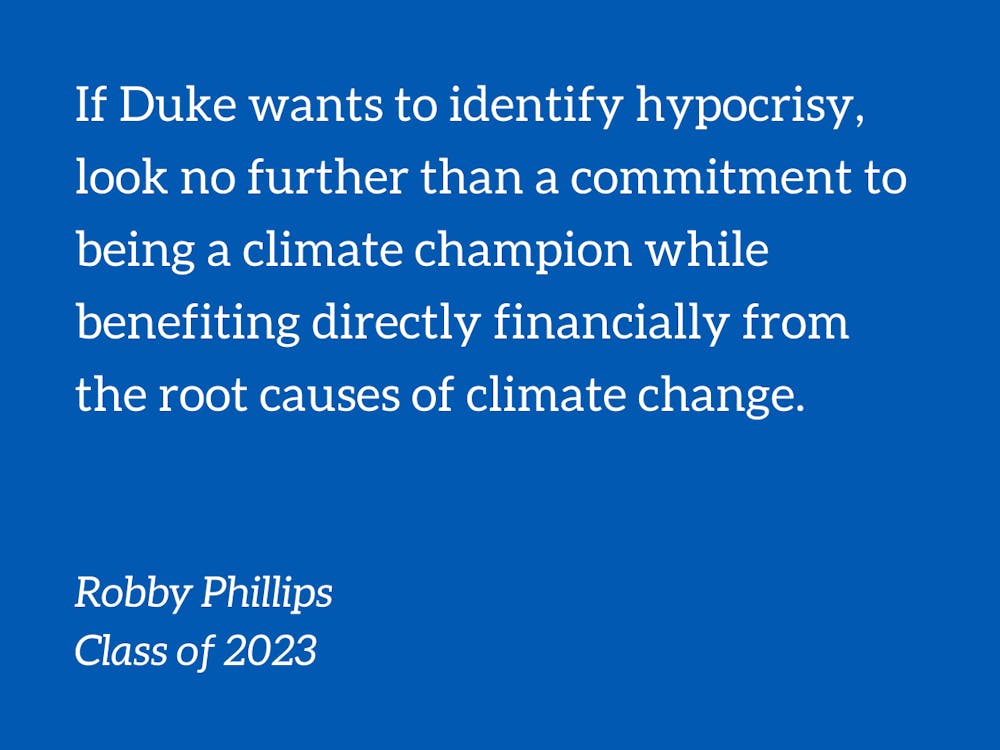Earlier this month, we elected a new DSG president by a razor-thin margin, with the two candidates separated by only twenty-five votes. On the same ballot and in stark contrast, the student body overwhelmingly voted in favor of the referendum for divestment of fossil fuel-affiliated holdings in the university’s endowment. 2,456 undergraduates voted “yes.” Only 203 voted “no.”
This broad consensus in favor of divestment is justifiably paired with cynicism. Most of the students who told me they would vote yes also remarked that it probably wouldn’t amount to anything. I have to confess to feeling similarly. And, so far, it hasn’t
After all, the referendum is hardly the first effort to pressure the University to divest. Various organizations, faculty and students of all levels have fought since at least 2012 for the University’s investments to recognize the existential threat posed by the climate crisis. Check out this article for an informative summary of these efforts over the years.
This latest effort was spearheaded by students in the Duke Climate Coalition’s Divestment Team, led by sophomore Brennan McDonald. They tabled on BC Plaza, gave out stickers and info sheets, and created an Instagram page through which students were able to share graphics detailing the case for divestment and encouraging classmates to vote in favor. Their efforts were clearly successful, and, as Brennan told me, the “results prove to the administration that divestment is no longer a niche issue and that there is increasing urgency for action.”
Given the extensive movement of the last decade, it is astonishing that neither Duke’s Advisory Committee on Investment Responsibility (ACIR) nor the Board of Trustees have seriously pursued divestment. It is especially disappointing as we are continually being left behind by our peer institutions. In September, Harvard announced it would move to divest, joining Yale, Georgetown, Brown, Boston College and dozens more. Many of these universities' plans have faults to be sure, but they are significant steps forward in the fight for a livable future.
ACIR and the Duke University Management Company (DUMAC) have provided a litany of reasons for opting not to divest from fossil fuels. The Divestment Team has broken them down in a recent Instagram series, but to elaborate more here:
ACIR has claimed that divesting would merely be symbolic and even hypocritical given that we largely rely on fossil fuels in our everyday lives to power our homes and get around. Well…yes we do, which is the reason we are facing a climate crisis and are pushing to move away from fossil fuels in the first place. The Board recognizes this need; they have made official (but vague) statements on addressing climate change and approved a plan for the University to achieve net neutrality in carbon emissions by 2024. By this logic, any effort to reduce harm we inflict on others or the world is hypocritical because we cannot instantly overturn the system in which the harm occurs—fortunately, such is not the case!
ACIR has also claimed that divesting won’t materially accomplish much, since others will simply buy up the shares Duke buys. This argument misses the central point of divestment, and seems to ignore the fact that Duke has divested from assets for social reasons in the past, most notably from South African-affiliated entities to oppose apartheid. It is true that Duke divesting alone wouldn’t be particularly impactful, but as mentioned earlier, universities and financial institutions around the world are joining the movement, having already divested $40.43 trillion. Duke joining the ranks would be hugely significant in continuing to shift the direction of our economy.
ACIR has argued that Duke is more able to influence the practices of fossil fuel companies if invested in them and that some of these entities are making a clean energy transition already. First, no evidence exists that Duke has influenced any company to reduce its emissions. And, while many fossil fuel companies have launched initiatives to reduce emissions, they are doing so far too slowly, especially after decades of covering up the science and threat of climate change. These companies also regularly lobby to stop climate and clean energy legislation from the federal to state level—not to mention donating large sums to politicians who legislate directly against Duke’s other purported values, including protecting the LGBTQ+ community.
In this year’s report, the Intergovernmental Panel on Climate Change issued another warning with heightened urgency that the window to prevent catastrophic climate change is closing. Many are heeding the call; activists are rallying globally, people from all walks of life are running for office with climate justice at the forefront, and major financial institutions and universities are investing for the future.
Duke has made important strides to address climate change, no doubt. But, if they want to identify hypocrisy, look no further than a commitment to being a climate champion while benefiting directly financially from the root causes of climate change.
Time is running out. It is time for Duke to decide which side it stands on. It cannot straddle the middle. Will we cling to the past and our wallet and contribute to climate catastrophe? Or will we join the future in facing the greatest challenge in human history? If Duke hopes to be a leader in any field, the answer should be clear.
Robby Phillips is a Trinity junior.
Get The Chronicle straight to your inbox
Sign up for our weekly newsletter. Cancel at any time.

